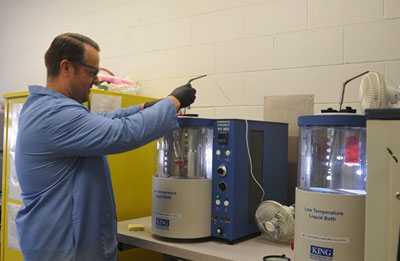In our latest blog we investigate why it is crucial to ensure you identify the correct hydraulic fluid viscosity for your hydraulic system.
As you may already know, fluid viscosity basically means the thickness of the fluid and its ability to tackle the job of lubrication, with many different factors having to be taken into consideration including system temperatures and pressures as well as environmental factors.
System performance and longevity can be greatly affected by using different viscous fluids as well as the various individual system components that can suffer reduced lifespans and early failures if the wrong fluid is used.
How do we define viscosity?
The size and also the structure of molecule chains are the crucial factors in measuring a fluids viscosity and the larger the molecules, the thicker the fluid.
As mentioned above, the viscosity of fluid can be greatly affected by various element s and perhaps one of the main catalysts is temperature. Basically, as the system temperature increases the fluid viscosity begins to decrease. The opposite is true when we reverse this process.
In an ideal world, a fluid which holds its viscosity level no matter what the temperature would greatly benefit a hydraulic system and protect its components, but sadly nothing has as yet been developed which meets these requirements.
To get around this hurdle, multi-grade fluids are used which typically have a high viscosity index and are less sensitive to temperate change than a typical monograde oil.
Things to watch
As lubrication is the prime objective of hydraulic fluid, it is essential that full lubrication is maintained even if temperatures fluctuate. If this does not happen, boundary lubrication is witnessed which means that only a thin layer of fluid works with system componentry, thus leading to possible friction issues and component wear.
Energy consumption is another area that is affected by fluid viscosity especially when too high a viscosity is used you will notice it when your fuel and electricity bills come through. On the other hand it is better to have a thicker fluid rather than thinner as it will help to avoid costly repairs to the system and components further down the line.
There are some changes to components you can make to help ensure that issues such as heat load are kept at bay. If you have a fixed pump on your system it is best to replace it with a variable pump as this helps control heat levels. Coupled with a suitable cooling fan this combination will aid efficient system running.
Of course, the initial design stage of a system is crucial to make sure your system components can control heat loads and if the unit is frequently moved into different environments, this must also be taken into consideration before you specify which type of hydraulic fluid you will require.
At Hydraproducts we have a skilled team of engineers who are always happy to guide you through hydraulic system requirements and specifications and can advise you on fluid suitability.





